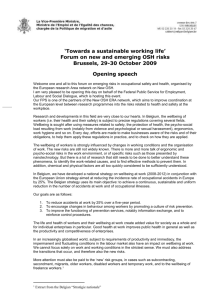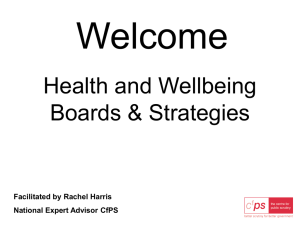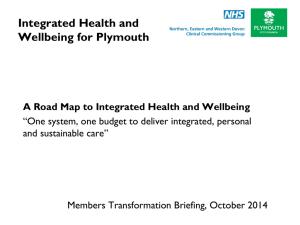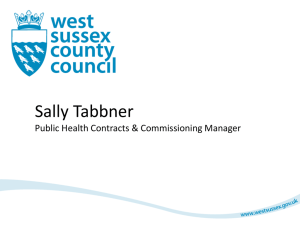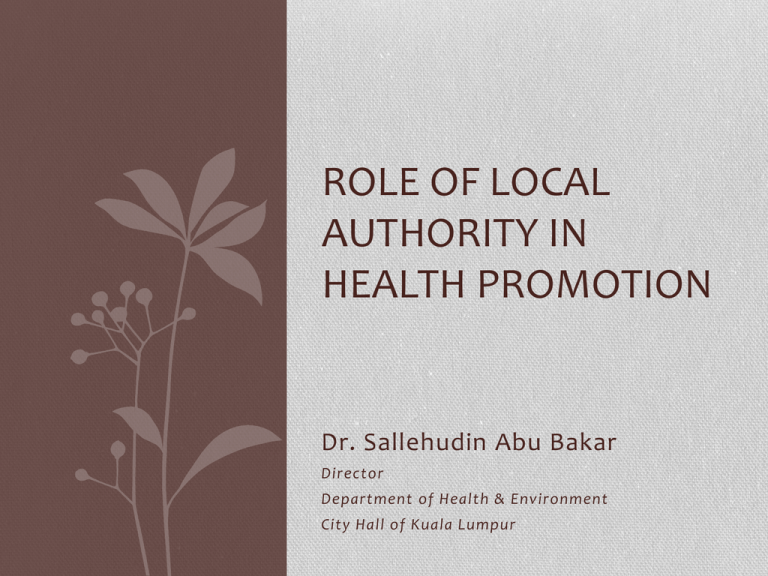
ROLE OF LOCAL
AUTHORITY IN
HEALTH PROMOTION
Dr. Sallehudin Abu Bakar
Director
Department of Health & Environment
City Hall of Kuala Lumpur
Introduction
• People’s lives and health are most acutely influenced at the
local level – in their homes, at school, in their places of work
and in their neighbourhoods
• This is also where citizens are most likely to come into contact
with services and support mechanisms to improve their lives
and health
• There is enormous potential, therefore, for local government
to influence the health of its local population
The concept of health
• Health is a state of physical mental and social wellbeing
• Wellbeing is a term that has cropped up increasingly frequently
over recent years, in politicians’ speeches, in policy documents and
the recent budget’s speech
• In a local government context, wellbeing is
•
•
•
•
About how people experience their own lives
More than the absence of problems or illness
About the personal and the social networking and connection
More than happiness
Prerequisites for Health
• The fundamental conditions and resources for health are:
• Peace
• Shelter
• Education
• Food
• Income
• A stable eco-system
• Sustainable resources
• Social justice, and
• Equity
Health Promotion
• Any intervention that seeks to eliminate or reduce
exposures to harmful factors by modifying human
behaviors; or any combination of health education
and related organizational, political and economic
interventions designed to facilitate behavioral and
environmental adaptations that will improve or
protect health
• Concerned specifically with sociobehavorial
processes
Lifestyle Factors
“Genes load the gun.
Lifestyle pulls the trigger”
Dr. Elliot Joslin
Choices Made In Regard To:
• Smoking
• Nutrition
• Exercise
• Substance Abuse
• Rest
• Stress
• Sexual behavior
• Other Life-style Factors
Smoking
“Tobacco is the most important single
preventable cause of death in the world today”
• In US responsible for 400,000 deaths/year.
• In Malaysia responsible for 12,000 deaths/year
• Smoking is increasing among teenagers in
Malaysia and elsewhere
Nutrition
• In US poor diet and lack of activity account for
about 300,000 deaths each year.
• Major concerns
• Obesity
• High Fat Diet
• High Sugar Diet
Healthy Eating Recommendations
• Eat at least three modest meals/day
• Moderate fat intake
• Moderate sugar intake
• Avoid large portions
• Eat five servings of fruits and vegetables daily
Exercise
“If exercise came in a bottle, it would be the most widely
prescribed medicine known to man.”
Sleep
• Most people need about 8 hours nightly to
function at maximum capacity.
• Over two-thirds of Americans report a sleeprelated problem.
• Sleep deprivation has been implicated in recent
train, bus, and airplane crashes bringing
attention to the importance of sleep.
Stress
• Continual stress in life sets off chemical
reactions in the body than can eventually lead
to illness.
• Individuals constantly under stress are at
greater risk for heart disease and other
conditions.
• Practicing healthy habits can help alleviate
stress.
Sexual Behavior
• Abstinence is only sexual behavior absolutely
free of risk, followed by life-time mutual
monogamy entered into at virginity
• Unsafe sex exposes an individual to
•
•
•
•
•
HIV virus
Hepatitis B
Genital herpes
Other sexually transmitted diseases
Unwanted pregnancy
Health Promotion
• Has been defined by the WHO’s 2005 Bangkok Charter for
Health Promotion in a Globalized world as “ the process of
enabling people to increase control over their health and its
determinants, and thereby improve their health”
• The primary means of health promotion occur through
developing healthy public policy that addresses the
prerequisites of health such as income, housing, food security,
employment, and quality working conditions
Health Promotion Action Means
• Build healthy public policy
• Create supportive environments
• Strengthen community actions
• Develop personal skills
• Reorient health services
Health Promotion Principles from the WHO
Health promotion initiatives should be planned and
implemented in accordance with the following
principles:
• Empowering: Health promotion initiatives should enable
individuals and communities to assume more power over
the personal, socioeconomic and environmental factors
that affect their health.
Health Promotion Principles from the WHO
• Participatory: Health promotion initiatives should involve
those concerned in all stages of planning, implementation
and evaluation.
• Holistic: Health promotion initiatives should foster physical,
mental, social and spiritual health.
• Intersectoral: Health promotion initiatives should involve
the collaboration of agencies from relevant sectors.
Health Promotion Principles from the WHO
• Equitable: Health promotion initiatives should be guided
by a concern for equity and social justice.
• Sustainable: Health promotion initiatives should bring
about changes that individuals and communities can
maintain once initial funding has ended.
• multi-strategy: health promotion initiatives should use a
variety of approaches, including policy development,
organizational change, community development,
legislation, advocacy, education and communication in
combination with one another
Advocate
• Good health is a major resource for social, economic and
personal development and an important dimension of quality
of life
• Political, economic, social, cultural, environmental,
behavioural and biological factors can all favour health of
otherwise
• Health promotion actions aims at making these conditions
favourable through advocacy for health
Enable
• Health promotion focuses on achieving equity in health
• Health promotion action aims at reducing differences in
current health status and ensuring equal opportunities and
resources to enable all people to achieve their fullest health
potential
• This includes a secure foundation in a supportive
environment, access to information, life skills and
opportunities for making healthy choices
• People cannot achieve their fullest health potential unless
they are able to take control of those things which determine
their health
Mediate
• The prerequisites and prospects for health cannot be ensured by
the health sector alone
• Health promotion demands coordinated action by all concerned; by
government, by health and other social and economic sectors, by
nongovernmental and voluntary organization, by local authorities,
by industry and by the media
• People in all walks of life are involved as individuals, families and
communities
• Professional and social groups and health personnel have a major
responsibility to mediate between differing interests in society for
the pursuit of health
Local Government’s functions
• Local government or local authority is the lowest level in the system
of government in Malaysia
• Currently there are 96 local authorities in Peninsular Malaysia, 23 in
Sabah and 25 in Sarawak
• Local authorities in Malaysia have been given wide powers within
the Local Government Act of 1976
• It has both mandatory and discretionary functions
• Mandatory functions include
• All critical functions such as refuse collection, street lighting and activities
pertaining to public health
• Discretionary functions include
• All developmental functions such as providing amenities, recreational
parks, housing and commercial activities
Local government roles
• The provisions of the Local Government Act 1976 grants local
authorities the following roles;
•
•
•
•
•
•
Local planning authority
Licensing authority
Power to impose certain kinds of taxes
Undertake building, housing and commercial construction
Power to perform urban planning and management functions
Traffic management and control, and power to plan and provide public
utilities
• Two other main laws, the Town and Country Planning Act (1976) and the
Street, Drainage and Building Act (1974), help local governments to
perform their functions under the Local Government Act 1976
Local government role in health promotion
5 key areas
• Strategic leadership
• Services and commissioning
• Strengthening communities
• Organizational level activity
• Measuring health outcomes
Strategic leadership
• Local government leaders can
• See it as their responsibility to set an overarching vision for health
promotion within environmental limits and to implement mechanisms that
provide strategic oversight of the health agenda
• Develop an overarching health promotion framework to guide councils
activity
• Allocate financial resources to strategies and programmes that promote
health of the population
• Advocate and communicate the benefits of health promotion to council
staff at all level, including those in strategic roles and people on the front
line of services provision
Services and commissioning
• Commissioners and service providers can act to:
• Use the commissioning process to encourage providers to identify and
deliver against health outcomes
• Use the establish evidence base to build health into the way services are
designed
• Take a co-production approach wherever possible, so that services are
design and delivered in partnership between users and professionals
• Include direct health promotion activities in the range of local government
provision
Strengthening communities
• Officers employed by local government can maximize the
capabilities of local people and empower them to help promote
their own health by
• Developing asset-based approaches that draw on the existing capabilities
and assets of residents to promote health at the local level
• Fostering the crucial social connections between people that are needed to
build the strong networks for the big society, where people feel competent
and powerful enough to help develop workable solutions to seemingly
intractable problems
• Devolving genuine power and control to communities
Organizational level
• HR and procurement directors can make use of organizational
levers to:
• Actively support the psycho-social wellbeing of council staff and help local
businesses to do the same with their employees
• Use procurement and recruitment policies to have a direct impact on the
strength of the local economy and the economic wellbeing of residents
• Foster a working culture that supports staff to understand and respond to
factors affecting the health and wellbeing of local residents and
communities
Measuring outcomes
• Performance officers, service managers and project officers can:
• Bring together existing data on levels of material wellbeing,
including variations in its distribution throughout the local
population
• Measure psycho-social wellbeing through subjective measures that
capture people’s experience of their lives






